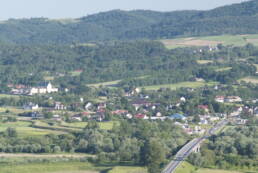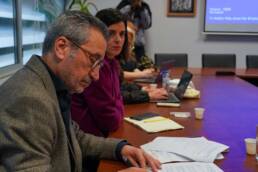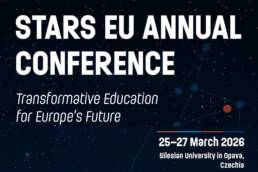Do you want to showcase your skills while working on an exciting project together with an international team of researchers and fellow students? Then we have a unique offer for you! During the Blended Intensive Programme (BIP) – FutureLab Camp you will get the opportunity to help develop tourism in and around Zakliczyn, a city in the southern part of Poland.
What we offer
During a week in Cracow, between February 25 and March 4, you will do research work on an ambitious challenge combined with learning about the local culture. This will be followed by online work on concepts until mid-June 2025. The project organizers have prepared an attractive program that will give you the opportunity to establish international contacts, and you will learn in practice how to work as a team on an interesting challenge, under the supervision of outstanding scientists.
Finding ways to develop Zakliczyn’s tourist potential and its infrastructure – this is one of the goals of the cooperation that the Cracow University of Technology has established with the Zakliczyn commune. The agreement was signed on December 18, 2024. As part of the agreement, the FutureLab Camp workshops will be held in 2025. Students from the Cracow University of Technology and foreign universities that are part of the STARS EU European University will be looking for ways to develop Zakliczyn.
How the developed student concepts will be used is the sole decision of the Zakliczyn authorities, but the commune admits that the offer is very interesting and the chances of implementing the developed concepts are high.
About the challenges
During the BIP, students from STARS EU will work on challenges related to the Zakliczyn commune located in Tarnów County (Lesser Poland Voivodeship) on the right bank of the Dunajec River (Google Maps link here). Zakliczyn is located in the Rożnów Foothills in a valley (206–250 m above sea level) on a flat, wide and north-open area, between the lower reaches of the Paleśnianka and Wolanka streams, surrounded by forested hills ranging from 300 to 503 m above sea level.
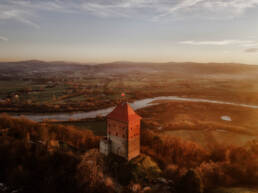
Near Zakliczyn stands the castle in Melsztyn – built in the Middle Ages, it regained its 28-meter tower after several centuries. The five floors offer views of the Dunajec river and the Tatra Mountains. Although work on the tower itself has been completed, its buttress will also undergo full reconstruction. This is probably not the end of work on the commune’s tourist attraction.
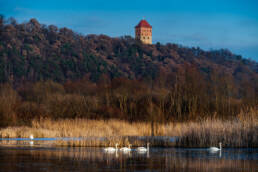
Until 2022, the castle belonged to the ‘State Forests’ Company. It is currently managed by the Zakliczyn commune. The commune is interested in, among other things, designing a pedestrian and bicycle footbridge over the Dunajec river (in place of the former bridge) connecting the castle – a tourist attraction of the region with the EuroVelo network of bicycle paths. In addition to the footbridge projects, the workshops are also to result in other ideas for the tourist and architectural enrichment of the commune.
Watch a promotional video of Zakliczyn commune
History of the city
The origins of Zakliczyn reach way back to ancient times. This town was already mentioned in 10th century documents. But back then, it had a different name. Some sources declare that it was Dunaiz, others, that Goluczyn. In 1086, it was owned by the Tyniec abbey and earned the name Opatkowice.
Another important date in the history of Zakliczyn was the year 1557, when the town, along with a few other local villages, was purchased by Spytek Wawrzyniec Jordan, who later became the castellan of Krakow. He did his best to give city rights to Zakliczyn. And he succeeded. Unfortunately, Zakliczyn lost its city rights, and didn’t get them back until 2006.
In the late 16th and early 17th century Zakliczyn began to rapidly develop, with handicraft and trade blooming. Sadly, about 100 years later, there was not much left behind Zakliczyn’s early greatness. Some of the reasons included fires, plagues, as well as the ‘Swedish Deluge’. In order to defend the catholic faith at this area, an order of priests were brought to Zakliczyn. Their monastery and church can still be seen here today.
There are roughly 2000 permanent citizens here. But still, it is one of the largest towns in the area.
Check promotional folder of the Zakliczyn borough (available in English)
Who are we looking for?
For workshop work in multidisciplinary teams on the above topic, we are looking for students with different competencies and skills to complement each other in work on concepts and studies. So if you have one or more of the following skills, you are welcome to apply:
1. Design and architectural competences
- Architectural Design: The ability to create architectural concepts that take into account local context and conditions.
- Urban and spatial planning: Knowledge of space management and creating harmonious urban solutions.
- Landscape Architecture
2. Social and communication skills
- Ability to conduct public consultations: Conducting interviews, surveys and workshops with residents.
- Empathy and listening skills: Understanding the needs and expectations of the local community.
- Teamwork: Collaboration in interdisciplinary teams.
3. Analytical and research competences
- Data Analysis: Ability to analyze survey results, demographic, economic and spatial data.
- Knowledge of local strategies and planning documents: Analysis of documents such as municipal development strategies.
- Environmental research: Identification of natural resources and assessment of their impact on spatial planning.
4. Creative and innovative competences
- Creating problem-solving concepts: Generating innovative spatial, social or economic ideas.
- Systems thinking: Considering different aspects (spatial, social, economic, environmental) in one project.
5. Technical competences
- 3D Modeling and Technical Drawing: Ability to visualize designs using digital tools (e.g. AutoCAD, SketchUp , Revit ).
- GIS Mapping and Analysis: Working with spatial information systems to analyze local conditions.
6. Cultural, historical, tourist and social competences
- Knowledge of cultural heritage: Understanding local history and cultural values, e.g. the significance of Melsztyn Castle, and the ability to use them to promote tourism in the region
- Promoting local traditions and the region: Taking them into account in the proposed solutions, considering the needs of the local community and various target groups (e.g. seniors, youth).
7. Environmental and Sustainability Competencies
- Ecodesign : Integrating sustainable development principles into designs.
- Knowledge of ecological technologies: Proposing environmentally friendly solutions.
8. Economic and management competences
- Cost and profitability analysis of projects: Development of economic justifications for proposed solutions.
Project Planning: Managing the stages of project implementation.
How to apply?
Students interested in participating are asked to contact the university coordinators by 12.01.2025. Please introduce yourself, provide your field of study in the content and attach this ‘Student application questionnaire‘ by email after completing it. Contact details for university coordinators can be found below.
The scientific supervisors of the project from the Cracow University of Technology will select 15-20 students whose skills meet the needs of the task and will send them confirmation of participation on January 25, 2025.
Please remember that the workshops will be conducted in English, so we require communicative knowledge of it.
University coordinators:
FRANCE (University of Franche-Comté)
Prof. Dr. Robin Roche
tel. +33 (0)3 84 58 34 79
e-mail: robin.roche@univ-fcomte.fr
PORTUGAL (Bragança Polytechnic University)
João Paulo Pereira
tel. +351 917594224
e-mail: jprp@ipb.pt
THE NETHERLANDS (Hanze University of Applied Sciences)
Elanna Veldkamp
tel. +31 (0)50 595 3760
e-mail: e.s.veldkamp@pl.hanze.nl
CZECHIA (Silesian University in Opava)
Ing. Tomáš Pražák, Ph.D.
tel. +42 0734409248
e-mail: prazak@opf.slu.cz
SWEDEN (University West)
Fredrik Christensson
tel. 070-103 99 80
e-mail: fredrik.christensson@hv.se
ALBANIA (Aleksandër Moisiu University of Durrës)
Arba Merhori
e-mail: arbamerhori@uamd.edu.al
GERMANY (Hochschule Bremen – City University of Applied Sciences)
Ercole Erculei
ercole.erculei@hs-bremen.de
SPAIN (University of La Laguna)
Verónica Pino
veropino@ull.edu.es
POLAND (Cracow University of Technology)
Task leader: Adam Sadło
tel. +48 512688272
e-mail: adam.sadlo@pk.edu.pl
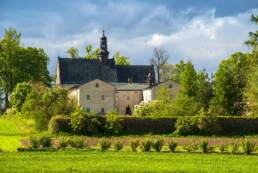
Related Posts
February 6, 2026
Celebrate the International Day of Women and Girls in Science with STARS EU
The alliance demonstrates its commitment to full and inclusive participation of…
February 3, 2026
Bragança Polytechnic University and University West strengthen their strategic cooperation in research and doctoral training within STARS EU
The meeting addressed the implementation of joint doctorates and the connection…
January 30, 2026
Education to address new challenges, focus of the third STARS EU Annual Conference
The next event will take place in March 2026 at the Silesian University in…

